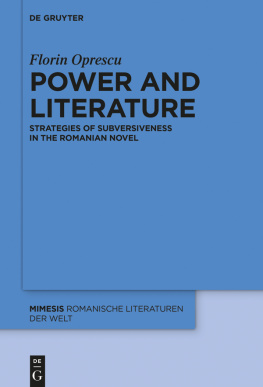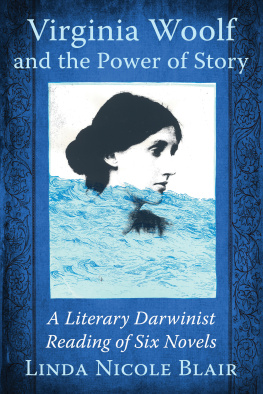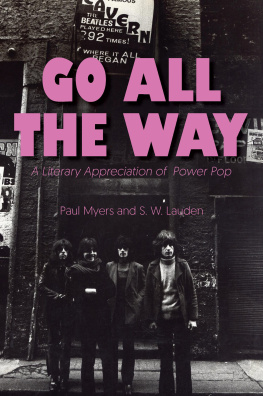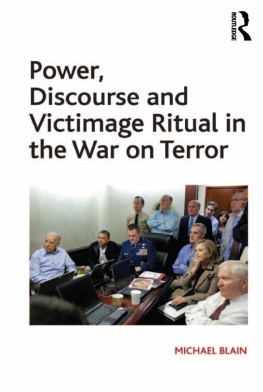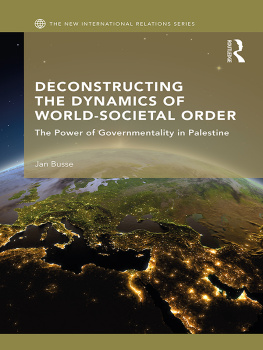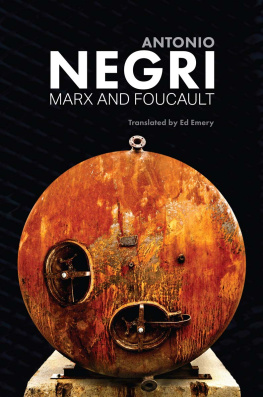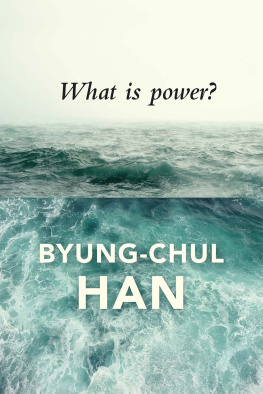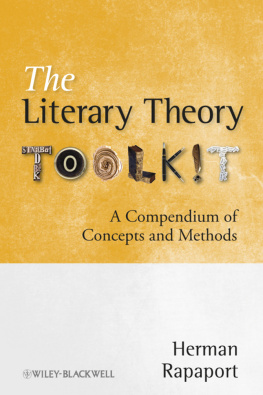Contents
Guide

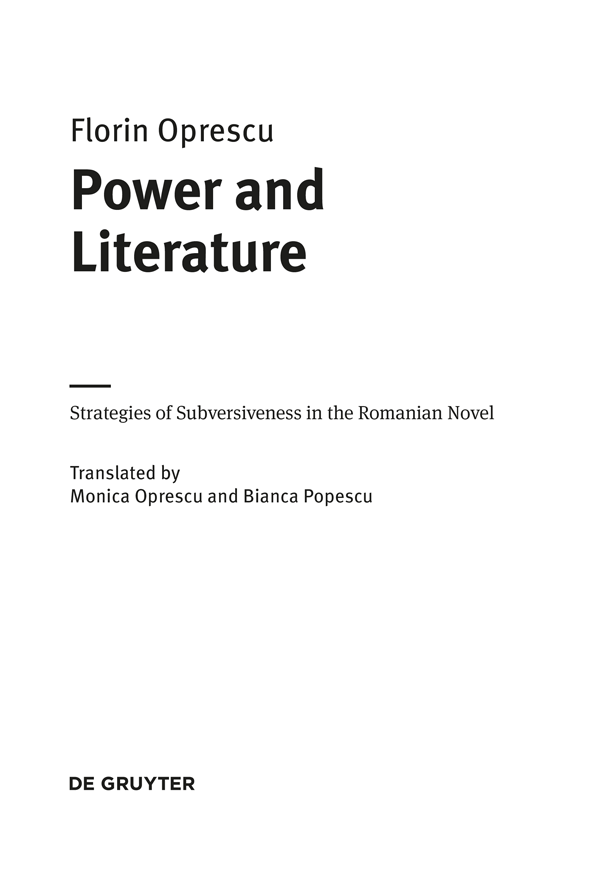
Florin Oprescu
Power and Literature
Mimesis

Romanische Literaturen der Welt
Herausgegeben von
Ottmar Ette
Band 71
Printed with founding from Rosita Schjerve-Rindler-Memory Fund/ Gedruckt mit Frderung des Rosita Schjerve-Rindler-Gedchtnisfonds
ISBN 978-3-11-060294-4
e-ISBN (PDF) 978-3-11-060537-2
e-ISBN (EPUB) 978-3-11-060305-7
ISSN 0178-7489
Library of Congress Cataloging in Publication Control Number: 2018026143
Bibliographic information published by the Deutsche Nationalbibliothek
The Deutsche Nationalbibliothek lists this publication in the Deutsche Nationalbibliografie; detailed bibliographic data are available on the Internet at http://dnb.dnb.de.
2018 Walter de Gruyter GmbH, Berlin/Boston
www.degruyter.com
Argument
The Study of Power in Literature. The Rupert Constant
La prose demande, pour se dvelopper, une certaine rigueur, un tat social diffrenci; et une tradition: elle est dlibre, construite; crer une littrature cest crer une prose.
In 1957, during his British exile, Chaplin released a film, reflective of the political context of the 50s and especially of the manner in which he understood the utility and usefulness of film in explaining the ideological slips of the middle of the century. It is the film A King in New York in which the director uses a satire to poke fun at McCarthyism, using it as instrument for exposing communist hunting excess, denouncing the inquisitorial practices of unmasking the communist subversives and traitors in the American society of the 50s.
The hunt for the reds under the beds presumed an ideological excess of the 50s, in a world affected by the trauma of the war. That had known the horrors of mass killings, the feeling of extinction, the immanency of nuclear entropy, all these accentuating the paralyzing fear and total suspicion amongst the constitutive states of the Cold War. The medium of transmitting these controlled fears was in Chaplins case the film and the determining character, who denounces the pseudo-pacifist rhetoric of the 50s, is the child Rupert Macabee, interpreted in the film by Chaplins own son. Young Rupert is the editor at a school paper, playing the adult role of a historian who gives an anarchist discourse to the exiled king. He is reading Marx during the Kings visit to the school when in the schools publishing press Shadov demands to know: Are you a communist?, to which Rupert replies: Cannot one read Marx without being a communist? He perorates with a mechanical voice and delivers a stereotypical, ideological discourse about the terror and the atrocity of life in Western society. This image from A King in New York is one of the strongest critiques of the 50s against rhinocerisation through seductive ideologies, giving a perspective over mass manipulation through the power of fear. The young Rupert is a propaganda machine, having lost his childhood, becoming an adult against his will. Through his un-natural discourse he shows the effect of continuous ideology pressure against man.
In fact, Roland Barthes observed the myth of the Poor and the Proletariat in Chaplins films, confirming: His anarchy, politically open to discussion, perhaps It is certain that the media was one of the most expressive way of denouncing all forms of political excess through his new expressive power of images in the tradition proved by Orson Welles, with his radio reading from the novel of H. G. Wells, The War of the Worlds or by his own Citizen Kane. Nevertheless, the tradition of literature cannot be ignored, even if there is an artistic discourse which permanently explored the territory of revolt against the officialising of excess, this was literary discourse, in its diverse forms and formulas. The great texts of our literary tradition, whether we are talking about Dante, Cervantes, Goethe or Shakespeare, denounced imbalance, social inequities, forms of excess.
The critique of excess is therefore one of the supreme stakes of modern art and especially of literature, even when literature does not render the world it is born indirectly, reflecting within the interiority, reflexivity of its characters the negative effects of a dysfunctional, exclusivist world, integrative through uniformity.
The self-reflexive compensation of the modern novel proves exactly this fact. The Proustian centering on memory or the continuous flux of Joycean narrativity for example, are not direct discourses of unmasking social excesses, but effects of a social modernity predisposed to excess and the alienation of the Subject. From this point of view we notice that the modern novel proposes a social symptomatology of excess as a representative form of modern collectivity, which goes beyond traditional aesthetical formulas of the novel. In the second half of the last century, of the Herderian Zeitgeist , in the discussion about the utility of art in society instruments of sociological or political philosophy were used in the discussion. Because the exclusively hermeneutical arguments could not cope with the expansion of the social sciences and the aesthetical autonomy, or with the cult for art demonstrated its uselessness in the process of social autonomy of the subject, the public figures of the 60s brought literature out of Sainte-Beuves tour divoire. The instrumentalization of literature in the social battle has reactivated the interest of its study as a social fact or phenomenon, understood as toute manire de faire, fixe ou non, susceptible dexercer sur lindividu une contrainte extrieure. This constraint of literature was seldom approached with methods coming from the sphere of sociological critique, from the theories of literary sociology promoted by Robert Escarpit, to the theory of social field of art by Pierre Bourdieu.
As a follow-up of the writing zero degree, theorized in 1953 by Barthes, Escarpit spoke about a certain type of sursignification, meaning un au-del reconfirms the interest of literary sociology for the constraint and determinism of the medium and a certain type of social existentialism of literature.
Anticipating Goldmann, with his book which has made history among the disciples of the discipline, Pour une sociologie du roman (1965), Escarpit declared himself, implicitly, through the study Sociologie de la littrature (1958), against French historical comparatism. He proposed a change of perspective, from the high, isolating and purist meta-literary discourse, to the statement that literature, especially the novel, function according to an actantial model of human relationship exchange. So the novel functions not only as autonomous literary fact, meaning a fact that makes sense only in a given community gear. Le nouvel quillibre
The most famous theory of referring art to a social field belongs to Pierre Bourdieu. Literature was not seen exclusively as a socially symbolic act, but as a cultural product of a certain society, therefore determined historically. Referring to the utilitarianism of the sociological theory in the field of literature, Pierre Bourdieu describes the rules of literary art by asking himself:
Does the claim for the autonomy of literature, which found its exemplary expression in Prousts Contre Sainte-Beuve , imply that the reading of literary texts should be exclusively

